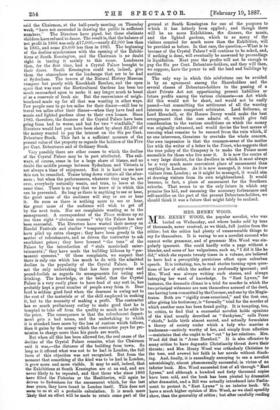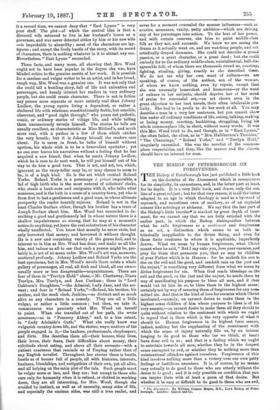MRS. HENRY WOOD.
MRS. HENRY WOOD, the popular novelist, who was buried on Wednesday, and whose books sold by tens of thousands, never received, as we think, full justice from the critics ; but the critics had plenty of unanswerable things to say for themselves. It is vexing to see a novelist succeed who cannot write grammar, and of grammar Mrs. Wood was sin- gularly ignorant. She could hardly write a page without a blunder, and some of her vulgarisms, such as, "I did it like he did," which she repeats twenty times in a volume, are believed to have had a perceptibly pernicious effect upon suburban speech. It is irritating, too, to read stories turning upon ques- tions of law of which the author is profoundly ignorant; and Mrs. Wood was always writing such stories, and always betraying her want of knowledge. In "East Lynne," for instance, the dramatic climax is a trial for murder in which the two principal witnesses are men themselves accused of the deed, one having been committed by the Coroner, and one by the Magis- trates. Both are "rigidly cross.examined," and the first one, after giving his testimony, is" formally" tried for the murder of which another man has been found guilty. It is tempting, too, to critics, to find that a successful novelist holds opinions of the kind usually described as " flunkyism," calla Peers "chiefs," holds birth almost sacred, and actually formulates a theory of society under which a lady who marries a tradesman—entirely worthy of her, and simply from affection —maintains that she ought to be " cut " by her relations. Mrs. Wood did that in "Anne Hereford." It is also offensive to many critics to have dogmatic Christianity thrust down their throats ; and Mrs. Henry Wood was orthodoxly Christian to the toes, and avowed her faith in her novels without flinch- ing. And, finally, it is exceedingly annoying to see a novelist astonishingly, almost .phenomenally successful, in virtue of an inferior book. Mrs. Wood succeeded first of all through "East Lynne," and although a hundred and forty thousand copies have been sold, and the book has been pirated by dramatist after dramatist, and a Bill was actually introduced into Parlia- ment to protect it, "East Lyons" is an inferior book. We have a mush higher opinion of Mrs. Wood, as we shall speedily show, than the generality of critics ; but after carefully reading
it a second time, we cannot deny that " East Lynne" is very poor stuff. The plot—of which the central idea is that a divorced wife returned to live in her husband's house as a governess, and was never detected either by him or his new wife —is improbable to absurdity ; most of the characters are lay- figures ; and except the lively bustle of the story, with its crowd of characters, there is nothing whatever in it to attract any one. Nevertheless, "East Lynne" succeeded.
These facts, and many more, all showing that Mrs. Wood ought not to have been popular in the degree she was, have blinded critics to the genuine merits of her work. It is possible for a careless and vulgar writer to be an artist, and in her broad, rough way, Mrs. Wood was a genuine one. It was not only that she could tell a bustling story, fall of life and animation and personages, and keenly interest her readers in very ordinary people, but she could create character. There is not in fiction any person more separate or more entirely real than Johnny Ludlow, the young squire living a dependent, or rather a sheltered life with relations, constitutionally feeble, but sensible, observant, and "good right through," who pours out pathetic, comic, or ordinary stories of village life, and while telling them unconsciously reveals himself. The stories he tells are usually excellent, as characteristic as Miss Mitford's, and much more real, with a pathos in a few of them which catches the very breath; but it is Johnny himself the readers care about. He is never in front, he talks of himself without egotism, his whole wish is to be a benevolent spectator ; yet no one ever leaves his narratives without a feeling that he has acquired a new friend, that when he meets Johnny Ludlow, which he is sure to do next week, he will put himself out of his way to do him a good turn. That is art, and art, too, which, ignorant as the story-teller may be, or may choose to seem to be, is of a high kind. So is the art which created Roland Yorke. Roland Yorke is a personage ci priori impossible, a lad of high birth who is the most natural of solicitors' clerks, who steals a bank-note and emigrates with it, who talks utter nonsense, and is the butt in a sense of a country town, yet who is from first to last a gentleman and a good man, in whose ultimate prosperity the reader heartily rejoices. Roland is not in the least Charles Surface either, though his brother has a trace of Joseph Surface about him. Mrs. Wood has succeeded in de- scribing a good and gentlemanly lad in whose nature there is a shallow impulsiveness so strong, that he may at a moment's notice do anything, yet leave the real substratum of his character wholly unaffected. You know that morally he never stole, but only borrowed that money, and borrowed it without thought. He is a new and surprising variety of the genus fool, and to interest us in him as Mrs. Wood has done, and make us all like him, and induce us all to see that such a person might be, pro- bably is, is art of no mean order. Mrs. Wood's art was, moreover, scattered profusely. Johnny Ludlow and Roland Yorke are the best specimens, but in Mrs. Wood's novels there exists a whole gallery of personages, all real, all flesh and blood, all our own— usually more or less disagreeable—acquaintances. There are four of them in "Trevlyn Hold" alone,—Mr. Chattaway, Diana Trevlyn, Mrs. Trevlyn, and Ann Canham ; three in "Lord Oakburn's Daughters,"—the Admiral, Lady Jane, and the ser- vant ; and four in "Roland Yorke,"—Roland, his brother, his mother, and the meek clerk, Jenkins,—as distinct and as much alive as any characters in a comedy. They are all a little vulgar, or rather a little common ; but then, we take it, commonness was precisely what Mrs. Wood set herself to paint. When she travelled out of her path, she wrote nonsense,—as in "Pomeroy Abbey," and, to a less extent, in "Lady Adelaide's Oath." What she really knew was vulgarish country-town life, and the stories, ways, motives of the people engaged in it,—the bankers, professionals, shopkeepers, and flirts. She describes them all—their houses, their lives, their loves, their fears, their difficulties about money, their solicitude about eating, and above all their servants—with a patient exactness that reminds ns of Freytag rather than of any English novelist. Throughout her stories there is bustle, bustle as of houses full of people, all with histories, interests, business, friendships, and antipathies of their own, yet all alive, and all helping on the main plot of the tale. Such people must be vulgar more or less, and they are; but except to those who care only for humanity when it is refined, or clothed in working dress, they are all interesting, for Mrs. Wood, though she avoided by instinct, as well as of necessity, many sides of life, and especially the unclean sides, was still a true realist, and
never for a moment concealed the meaner influences—such as avarice, meanness, vanity, petty ambition—which are driving any of her personages into action. To the best of her power, and with certain reserves, she tries to paint middle-class folk as they are, and succeeds. We know we are seeing the drama as it actually went on, and are watching people, and not artistically draped dummies. She could not describe a grand passion, or a great character, or a great deed ; but she could embody for us the ordinary middle-class, unintellectual, half-die- agreeable folk, of whom there are thousands round us, courting, fighting, stealing, giving, exactly as she described them. We do not see why her own want of culture—we are speaking, of course, of the author, not of the woman, of whom we know nothing, even by repute, except that she was unusually benevolent and humorous—or the want of culture in her subjects, should deprive her of her meed, of praise for successful art,—an art shown even in the great objection to her best novels, their often intolerable pro- lixity. She had to be prolix to do her work at all. Yon may describe a man in a very few sentences, but you cannot ahow. him under all ordinary conditions of life, eating, talking, making or losing money, courting, backbiting, struggling, living he whole commonplace life, in short, without many words. It was this Mrs. Wood tried to do, and though, as in "East Lynne," she often failed, she often, as in" Mrs. Halliburton'e Troubles," "The Channings," "Roland Yorke," and "Trevlyn Hold," singularly succeeded. She was the novelist of the common- place respectables, and they, like the masses and the classes, should have an interest for man.



































 Previous page
Previous page